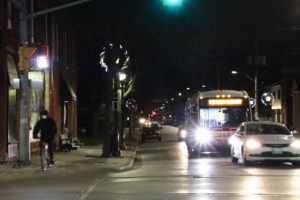City council debate mayor’s power to suspend transit

A Windsor bus passes the intersection at Mill Street at Sandwich, on Dec. 7, 2020. (Photo by Ravishan Wijemanne)
Members of Windsor city council are considering operating transit in a time of crisis without designating it an essential service.
The Environment, Transportation and Public Safety standing committee decided against designating transit an essential service on Nov. 25, after considering a report by City administration. The report showed that naming transit an essential service would create labour complications and limit the effectiveness of the Ontario Emergency Measures and Civil Protection Act.
“This is a lot more tangled than I originally anticipated,” said Coun. Fabio Constante. “I am glad the committee motion was to explore this further because it helps us understand how to move forward.”
The committee asked for the initial report on July 22 following mayor Drew Dilken’s decision to suspend transit in the early weeks of the pandemic. In contrast, Transit London maintained service since the state of emergency with rear-boarding and lowered travel frequency. Hamilton Transit Service reduced passenger capacity to 10 in 40-foot buses and to 15 in 60-foot buses. Transit Windsor had a ridership of about 138,000 per week as of 2019. Since reopening service, between the period of May 4 and July 4, ridership was down by about 85 per cent.
Constante said the purpose of the original motion was to determine if transit could run in any scenario. The committee moved for another report on vesting power to make decisions regarding transit in times of crisis with the whole council, as opposed to only the mayor.
In addition to the workers’ right to strike, city solicitor Shelby Askin-Hager said occupational health and safety guidelines need to be taken into consideration, especially when deeming a service as essential or making any change to the EMPCA.
“We will be very reluctant to recommend procedural mechanism that would override the EMPCA,” said Askin-Hager. “The problem is this plan has to respond to everything from a fire to a nuclear emergency to a computer outage or failure. To say we are going to step in and impose limits on the authority granted by the province to deal with situations we can’t even necessarily conceive of across the board – I don’t know if that is something we would really be able to recommend.”
Opposing Constante’s motion, Coun. Fred Francis said the powers exercised by the mayor have been given by the province.
“I really don’t have any interest in playing these political games,” said Francis. “If people don’t like what the mayor did, fine, don’t like what the mayor did… And the last thing I want to do is to limit the ability of whoever the head of council is in the future to navigate through a crisis. I don’t think that serves the people of Windsor very well. I think that’s dangerous and irresponsible.”
Coun. Kieran McKenzie, who originally requested council to make transit an essential service, said the discussion is not overly political but important from a governance standpoint.
“It has nothing to do with any personal assessments,” said McKenzie. “It has to do with governance. The emergency management protocols are extraordinary powers that are invested into a single individual.”


